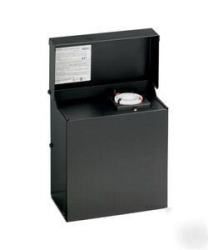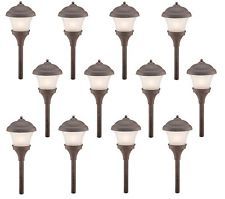Hello all,
I am looking for advice/knowledge on the safety of low voltage landscape lighting around the pool.
Our pool finished construction in late September, we got a few weeks of use before we shut it down over the winter. The winter has been spent wrapping up some concrete work, moving rock, building pergolas, and getting everything ready for an awesome pool year this year.
Tired of the solar landscape lighting I have used around the yard over the last few years, I bit the bullet and bought low voltage lights. It is a typical setup of Malibu equipment, transformer, walkway lights, spots, and floods, quick pictures below. I planned the layout, ran all the wires, and got everything up and running. Everything looks great and the yard and pool look awesome with the lights on at night!


So here is where I need help: As I was planning and installing the lights I read the "not within 10 feet of water" on the instructions. In a world full of disclaimers..."don't put your head in a 5 gallon bucket you might drown, keep that plastic bag away from your face or you will die..." I didn't put a lot of weight on the "near water" disclaimer. I figured the lights are not going to end up in the pool so there shouldn't be a problem, right? Well, they are going to get splashed when the boys are cannonballing in, there are three fixtures within 6 feet of the water. So after stewing on this all winter I am getting worried that my disclaimer brush off was not a good idea. Electricty is a scary thing that I am not well versed in. I guess I took to the notion that the low voltage aspect of the lighting was not as serious. I do recall a voice from my Dad many years ago saying "it's not the volts that get ya, it's the amps."
What says you? Splashing of lights going to cause disaster? Only when turned on? Only when plugged in? Always? Never? Just looking for some information and guidance.
Thanks,
J.
I am looking for advice/knowledge on the safety of low voltage landscape lighting around the pool.
Our pool finished construction in late September, we got a few weeks of use before we shut it down over the winter. The winter has been spent wrapping up some concrete work, moving rock, building pergolas, and getting everything ready for an awesome pool year this year.
Tired of the solar landscape lighting I have used around the yard over the last few years, I bit the bullet and bought low voltage lights. It is a typical setup of Malibu equipment, transformer, walkway lights, spots, and floods, quick pictures below. I planned the layout, ran all the wires, and got everything up and running. Everything looks great and the yard and pool look awesome with the lights on at night!


So here is where I need help: As I was planning and installing the lights I read the "not within 10 feet of water" on the instructions. In a world full of disclaimers..."don't put your head in a 5 gallon bucket you might drown, keep that plastic bag away from your face or you will die..." I didn't put a lot of weight on the "near water" disclaimer. I figured the lights are not going to end up in the pool so there shouldn't be a problem, right? Well, they are going to get splashed when the boys are cannonballing in, there are three fixtures within 6 feet of the water. So after stewing on this all winter I am getting worried that my disclaimer brush off was not a good idea. Electricty is a scary thing that I am not well versed in. I guess I took to the notion that the low voltage aspect of the lighting was not as serious. I do recall a voice from my Dad many years ago saying "it's not the volts that get ya, it's the amps."
What says you? Splashing of lights going to cause disaster? Only when turned on? Only when plugged in? Always? Never? Just looking for some information and guidance.
Thanks,
J.

